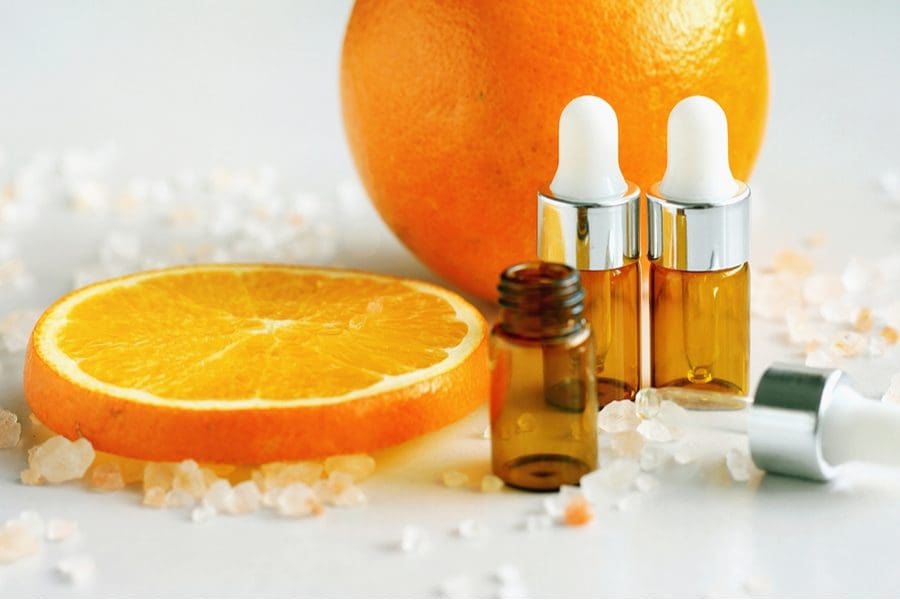Vitamin C has been having its moment for quite some time…moisturizers, face wash, serums…it’s everywhere, and can be found in every step of a skincare routine. What caused this ingredient to flood the market? Well, probably brands touting that vitamin C can fix any skin problem. Is a panacea ingredient too good to be true? Maybe.
While vitamin C won’t give you perfect baby skin overnight, it is a powerful antioxidant that defends your skin from environmental factors like sun, pollution, and dry air.
An impressive list of vitamin C’s reported benefits:
- May defend against UV damage
- Promotes collagen production
- May lighten dark spots and brighten skin
- May reduce the appearance of wrinkles
- Diminishes the appearance of scars
- Hydrating
While vitamin C can improve and protect any skin type, you don’t need it in every product you use—that’s too much of a good thing and could cause irritation and breakouts. Aim for one hero product with vitamin C, like a serum. Serums give you the best results for the least amount of product. Here’s what you need to know about incorporating vitamin C into your skincare routine.
Concentration
The concentration of vitamin C in a product needs to be effective but not irritating. Some experts recommend serums containing between 10 and 20 percent L-ascorbic acid—the most researched and active form of vitamin C. This is just a starting point, however, as everyone’s skin is different. It may take some time to find the right concentration for you.
Timeless Skincare makes a popular 20% vitamin C serum with Ferulic Acid and Vitamin E ($17.95, shop here). The high concentration of vitamin C makes this serum very effective but potentially irritating for sensitive skin. Patch test this product on the inside of your elbow before trying it on your face.
When to Use
Vitamin C should be applied after cleansing (and toning, if you use a toner) and before any moisturizing ingredients that might block its potency, which is why it’s most effective to get your vitamin C in serum form. While you can use vitamin C morning or night, it works particularly well when combined with sunscreen to prevent sun damage during the day.
Naturium, a new and affordable skincare line at Target, has a best-selling Vitamin C Complex Serum ($20, shop here). Its highly stabilized, encapsulated form of L-ascorbic acid makes the formula much less irritating to the skin. Sensitive ladies, rejoice!
Conflicts
Skincare has become much more science-driven since the rise of transparent, ingredient-focused brands like The Ordinary (shop here) and The Inkey List (shop here). Many products contain skin-transforming actives like chemical and physical exfoliators, retinol, and peptides. However, the skin barrier is very delicate (ideal pH is between 4.7 to 5.7), and aggressively layering products can damage it, leading to redness, acne, itchiness, dryness, and rough patches.
To protect your skins barrier, avoid using vitamin C in the same routine with acids or retinol. A good rule is to use vitamin C in the morning and other active ingredients at night. Pay attention to how your skin looks and feels, too. If your skin is irritated, give the acids a rest for a night or two.
Storage
Vitamin C can destabilize and oxidize very quickly when exposed to air and light, making it less effective and more irritating. Choose products that come in a tinted pump or tube to protect the actives from light and air.
Oskia Super C Smart Nutrient Beauty Capsules ($74.25, shop here) are intelligently (and adorably) packaged. Each capsule has a twist-off neck guaranteed to maintain the freshness and integrity of the serum. Each capsule contains a proprietary blend of vitamins C and E, sweet almond oil, and other nutrients and actives.
Vitamin C is a powerful, beneficial ingredient to use in your routine. Finding the proper balance, the right product, and the correct usage can leave you with a bright, glowing complexion.








Thank you.